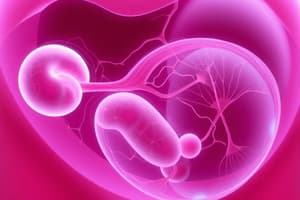Podcast
Questions and Answers
How many human babies are born each day?
How many human babies are born each day?
365,000
What is DNA 'very good' at?
What is DNA 'very good' at?
making copies of itself
What risk is there for a species that only reproduces by cloning?
What risk is there for a species that only reproduces by cloning?
If one person has a weak immune system, one successful parasite could wipe us all out
How does the DNA of sexually produced offspring compare to the DNA of the parents?
How does the DNA of sexually produced offspring compare to the DNA of the parents?
Signup and view all the answers
How many sperm are produced by the average human male?
How many sperm are produced by the average human male?
Signup and view all the answers
What process is used to make sperm cells and egg cells?
What process is used to make sperm cells and egg cells?
Signup and view all the answers
What happens to the genes when two chromosomes 'embrace'?
What happens to the genes when two chromosomes 'embrace'?
Signup and view all the answers
What is the advantage of diversity within a species?
What is the advantage of diversity within a species?
Signup and view all the answers
When does a human female produce her eggs?
When does a human female produce her eggs?
Signup and view all the answers
What danger confronts sperm in the vagina?
What danger confronts sperm in the vagina?
Signup and view all the answers
What does the sperm need to be allowed through the egg's zona?
What does the sperm need to be allowed through the egg's zona?
Signup and view all the answers
How much time passes between fertilization and the first division of the zygote?
How much time passes between fertilization and the first division of the zygote?
Signup and view all the answers
After fertilization, how long does it take for the blastocyst to arrive in the uterus?
After fertilization, how long does it take for the blastocyst to arrive in the uterus?
Signup and view all the answers
What risk does the blastocyst face after it attaches to the uterus?
What risk does the blastocyst face after it attaches to the uterus?
Signup and view all the answers
True or False: All cells have the same genes
True or False: All cells have the same genes
Signup and view all the answers
What does a gene do when it has been turned on?
What does a gene do when it has been turned on?
Signup and view all the answers
Where specifically does the baby get its nutrients from?
Where specifically does the baby get its nutrients from?
Signup and view all the answers
Does the blood of the mother and the baby ever mix?
Does the blood of the mother and the baby ever mix?
Signup and view all the answers
How old is the fetus when it gains the ability to hear sound?
How old is the fetus when it gains the ability to hear sound?
Signup and view all the answers
What is the main job of the fetus during the last trimester?
What is the main job of the fetus during the last trimester?
Signup and view all the answers
Study Notes
Reproduction and Development
- 365,000 human babies are born each day, indicating high reproductive rates globally.
- DNA is highly efficient at self-replication, ensuring genetic information is preserved across generations.
- Cloning as a reproduction method poses risks; a single pathogen could devastate a species with shared weak immune systems.
- Offspring from sexual reproduction inherit an equal contribution of DNA (50%) from each parent.
- An average male produces around 200 million sperm, highlighting the competition for fertilization.
- Gametes (sperm and egg cells) are produced through the process of meiosis.
Genetic Exchange and Diversity
- Chromosomes can exchange DNA when they pair, increasing genetic variation.
- Genetic diversity within a species improves adaptability and survival, raising chances of speciation.
- Females produce their eggs while still in the fetal stage, emphasizing early developmental processes.
Fertilization and Early Embryonic Development
- Sperm encounters an acidic environment in the vagina, presenting a challenge for successful fertilization.
- For sperm to penetrate the egg's zona, specific protein matches are necessary, demonstrating biochemical compatibility.
- Approximately 24 hours elapse from fertilization to the first division of the zygote, marking the start of cell division.
- The blastocyst takes about 5 days to reach the uterus after fertilization, essential for implantation.
- Once implanted, the blastocyst may face immune rejection from the mother's body, posing a risk to development.
Genetics and Nutrition During Pregnancy
- Not all cells in an organism contain identical genetic material; different types of cells express specific genes.
- Gene activation involves loosening DNA, indicating that certain environmental factors play a role in gene expression.
- The placenta serves as the primary source of nutrients for the developing fetus.
- There is no mixing of blood between the mother and the fetus, ensuring a separate circulatory system.
Fetal Growth and Sensory Development
- A fetus develops the ability to hear sounds at around 5 months gestation, indicating advancements in sensory development.
- The primary task of the fetus during the last trimester is growth, preparing for birth and life outside the womb.
Studying That Suits You
Use AI to generate personalized quizzes and flashcards to suit your learning preferences.
Description
Test your knowledge on key concepts from the PBS-NOVA documentary 'Life's Greatest Miracle'. These flashcards cover topics such as human reproduction, DNA functions, and the implications of cloning in species. Perfect for students and biology enthusiasts alike!




